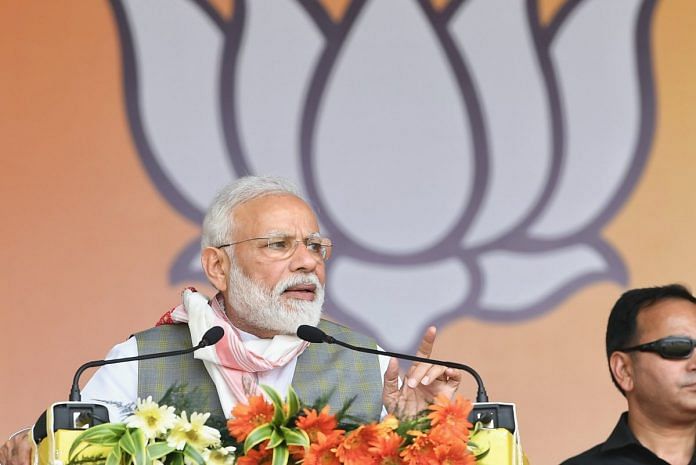In a hamlet nestled deep in Sumatra’s palm country, headman Slamet — who, like many Indonesians, goes by only one name — was eagerly showing off a 267-meter stretch of concrete to the nation’s minister for villages one recent March afternoon.
If Indonesia’s President Joko Widodo can beat a path to a second term on April 17, he should give credit to the two-meter-wide road — and to the popular village-fund program that financed its construction, overseen by minister Eko Putro Sandjojo.
That 70 trillion rupiah ($5 billion) program, named Dana Desa (literally “the wealth of villages”) has on average built a little more than 600 meters of roads a year in each rural agglomeration. Modest? Think again: the archipelago has 75,000 villages. That’s 191,000 kilometers of roads over the first four years of the program, more than a third of the network that existed in 2010.
Jokowi, as the president is known, came to power in 2014. Alongside inheriting a massive shortage of public infrastructure, he also got the benefit of a newly passed law that aimed for the first time in the nation’s history to guarantee a part of the state budget to villages. The idea was to let the nearly half of Indonesia’s 265 million people who live in rural areas decide for themselves whether they needed a maternity center or a communal toilet.
Villagers’ associations had demanded a billion rupiah for each settlement. But instead of allocating 75 trillion rupiah, Jokowi gave only 21 trillion rupiah in the first year. Even then only 82 percent of the money was used. So the president plucked the engineer-MBA Eko from the private sector to run Dana Desa, and doubled the allocation.
With 40,000 university-trained facilitators educating villagers in the complex accounting they need to get their projects approved and audited, fund use is now running at 99 percent. The budget has bulked up to a minimum 700 million rupiah per village. Depending on area, population and underdevelopment, the amount can go up to 4 billion rupiah.
Also read: Indonesia grabs the upper hand over India in battle of high-yielding bond markets
The success of the fund could play a role in Jokowi’s reelection bid. When it comes to articulating grand ideas, rival Prabowo Subianto, a pedigreed ex-general, wins hands down over former furniture maker Jokowi. The urban middle class, who had backed Jokowi as an underdog in 2014, is now disillusioned. Some businessmen believe they’re losing opportunities to state-owned enterprises, even as the tax authorities try to extract more revenue from them. Signature projects like the Chinese-built Jakarta-Bandung high-speed rail haven’t progressed. Five surveys give Jokowi a lead of 12 percent to 23 percent over Prabowo — but with 10 percent to 13 percent of voters undecided, it could be a close race.
To the extent Jokowi does have an advantage, it comes from the grassroots where the main issues are livelihood and identity. Villages minister Eko comes from a political party that represents Islam Nusantara, a tolerant Indonesian tradition at peace with indigenous customs. It’s in a battle for hearts and minds with a more puritanical Wahhabi influence rushing in from the Middle East, feasting on social-media falsehoods and hatred. As a result, economic development is crucial. Jokowi — or for that matter, Indonesia — can’t afford a lumpen army of 79 million millennial voters with nothing to do because the China-fueled commodity boom has gone bust.
As a former businessman, Eko believes in scale. Pandeglang district in southwestern Java wanted to plant corn. Eko’s team identified 50,000 hectares of abandoned land; organised free seeds, fertilizer and tractors; brokered a sales contract to a poultry feed mill; and then used that to get loans for the villagers. Suddenly, a 2 trillion rupiah corn economy has sprung up in a region where 65 percent of villages were considered underdeveloped in 2014. By the end of this year, all settlements in Pandeglang will have shed that tag, Eko says.
Poverty in villages has fallen by 1 percentage point since March 2016, helping pull the nationwide rate to below 10 percent. Dana Desa is also fighting stunting in children, thereby lifting future economic capacity. There are lessons here for India ahead of its own elections starting next month, with the two main parties trying to outdo each other on direct cash transfers to people amid agrarian distress and insufficient urban wages. As Rathin Roy of the New Delhi-based National Institute of Public Finance and Policy puts it, India is transitioning from a development state to a compensatory state.
Also read: Millennial voters will be the face of India & Indonesia in 2019
Resource-rich Indonesia, with a far smaller problem of mass poverty, is sticking to development — and there’s plenty of work still to do.
As we head back toward the airport in Bengkulu, Eko points to thickets of palm or rubber where trucks can’t go. How will people move that produce to markets, he asks. It’s no empty musing.
If the minister fails to solve similar problems for Indonesia’s rural population, he risks losing voters to fake news that Jokowi is a communist, a Christian or an ethnic Chinese. That’s an issue that should matter to the world well beyond the back country of Sumatra. – Bloomberg




Mr. Mukerjee- there are hundreds if not thousands such stories in India – specially in Tamilnadu,south India where a lot of good development work is being done by officials may be without no one noticing. Hence you need not be pessimistic about India- lot of development is going on but a lot to be done!
Very good to hear that, sir. The midday meal scheme for children has been wonderful for both education and nutrition, came from Tamil Nadu.
A compensatory state cannot be created from a daily per capita income of $ 6.